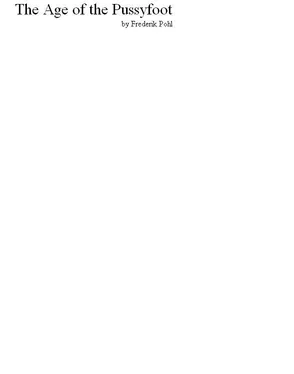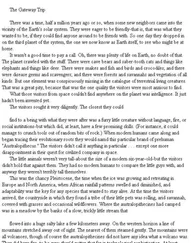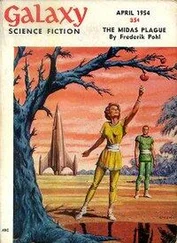Pohl, Frederik - The Age of the Pussyfoot
Здесь есть возможность читать онлайн «Pohl, Frederik - The Age of the Pussyfoot» весь текст электронной книги совершенно бесплатно (целиком полную версию без сокращений). В некоторых случаях можно слушать аудио, скачать через торрент в формате fb2 и присутствует краткое содержание. Жанр: Старинная литература, на английском языке. Описание произведения, (предисловие) а так же отзывы посетителей доступны на портале библиотеки ЛибКат.
- Название:The Age of the Pussyfoot
- Автор:
- Жанр:
- Год:неизвестен
- ISBN:нет данных
- Рейтинг книги:4 / 5. Голосов: 1
-
Избранное:Добавить в избранное
- Отзывы:
-
Ваша оценка:
- 80
- 1
- 2
- 3
- 4
- 5
The Age of the Pussyfoot: краткое содержание, описание и аннотация
Предлагаем к чтению аннотацию, описание, краткое содержание или предисловие (зависит от того, что написал сам автор книги «The Age of the Pussyfoot»). Если вы не нашли необходимую информацию о книге — напишите в комментариях, мы постараемся отыскать её.
The Age of the Pussyfoot — читать онлайн бесплатно полную книгу (весь текст) целиком
Ниже представлен текст книги, разбитый по страницам. Система сохранения места последней прочитанной страницы, позволяет с удобством читать онлайн бесплатно книгу «The Age of the Pussyfoot», без необходимости каждый раз заново искать на чём Вы остановились. Поставьте закладку, и сможете в любой момент перейти на страницу, на которой закончили чтение.
Интервал:
Закладка:
“Fun?” demanded the girl, jumping up and down. “Wasn’t it, Charles? Wasn’t it fun?”
But her brother was staring disgustedly at a readout on his desk. “Tunt,” he grumbled, “you should know better. Don’t you see the tally? We were late locking up. There was a crew of three there, and two of them are scored dead . . . and we never even got to see the Sirian at all. Just him.”
“I’m sorry, Tunt. I’ll look better next time,” the little girl said repentantly.
“Oh, it’s not you.” He glared past her at Forrester and said bitterly, “They set the norms for a three-person mission. As if he was any help.”
Thoughtfully Forrester picked up the mace of his joymaker, selected a button, pointed it at the base of his skull just behind the ear, and squirted. He was not sure he had picked the right joy-juice for the occasion; what he wanted was something that would make him tranquil, happy, and smart. What he got was more like a euphoric, but it would serve.
He said humbly, “I’m sorry I messed it up for you.”
“Not your fault. Should have known better than to take you, anyway.”
“But I wish we’d seen the Sirian,” said the little girl wistfully.
“I think I did. A big bright ship? Coming toward us?”
The boy revived. “Really? Well, maybe that’s not so bad, then. You hear that, monitor?” He listened to what was, to Forrester, an inaudible voice from his teaching machine, then grinned. “We got a tentative conditional,” he said happily. “Take it again next week, Tunt. For record.”
“Oh, wonderful!”
Forrester cleared his throat. “Would you mind telling me exactly what it was we just did?” he asked.
The boy put on his patient expression. “It was a simulated mission against the Sirian exploring party in the chromosphere of Mira Ceti. I thought you knew that. Basically a real observation, but with the contact between our ships and theirs variably emended.”
“Oh. Uh-huh.”
The boy looked quizzically at him. He said, “The thing is, Charles, we get graded on these simulations. But it’s all right; it didn’t hurt us.”
“Sure.” Forrester could feel the beginnings of an idea asserting themselves. No doubt it was the spray from the joymaker, but . . . “Could you do the same trick with some other things about the Sirians? So I could get a better look at them? Maybe the original encounter, for instance?”
“Neg.” The boy glared at his sister. “It’s Tunt’s fault, of course. She cried when the Sirians got killed. We have to wait to take the prebriefing over when we’re older.”
The little girl hung her head. “I was sad,” she said defensively. “But there’s other things we can do, Charles. Would you like to see the coconut on the Moon?”
“The what?”
“Oh, sweat. We’ll just show you.” The boy scratched his ear thoughtfully, then spoke to his junior joymaker. The view-walls clouded again.
“It’s supposed to be another artifact like the one the Sirians were searching for in Mira Ceti’s atmosphere,” he said over his shoulder, manipulating his teaching machine as he spoke. “Don’t know much about it, really. It’s not Sirian. It’s also not ours. Nobody knows whose they are, really, but there are lots of them around—and the Sirians don’t seem to know any more about them than we do. They’re old. And this is the nearest one.”
The view-walls cleared to show the lunar Farside. They were near the terminator line, with crystalline white peaks and craters before them, the jet black of a lunar night to one side. They were looking down into the shallow cup of a crater, where figures were moving.
“This is just tape,” the boy said. “No participation. Just look as long’s you want to.”
There was a clump of pressure huts in the crater. Perhaps they were laboratories, perhaps housing for the scientists or for those who were studying the “artifact” in the center of the screen—or who had been studying it once, perhaps, and had given it up.
It did indeed look like a coconut. As much as it looked like anything.
It was shaggy and rather egg-shaped. Its tendrils of—whatever they were—were not organic, Forrester thought. They were almost glassy in their brightness, reflecting and refracting the sunlight in a spray of color. By the scale of the huts, the thing appeared to be about the size of a locomotive.
“It’s empty, Charles,” volunteered the girl. “They all are.”
“But what are they?”
The girl giggled. “If you find out, tell us. They’ll make us twelfth-phase for sure!”
But the boy said kindly, “Now you know as much as anybody does.”
“But the Sirians must—”
“Oh, no, Charles. The Sirians are late arrivals. Like us. And that thing’s been there, just the way it is now, for no less than a couple gigayears.” He switched off the scene. “Well,” he said brightly. “Anything else you want to know?”
There was indeed. But Forrester had grasped the fact that the more he got to know, the more he was going to realize how little that knowledge was.
Astonishingly enough, it has not really occurred to him before this that a lot of things had been happening to the human race while he was lying deep in the liquid-helium baths of the West Annex Facility. It was like a story in a magazine. You turn a page. Ten years have passed; but you know perfectly well that they weren’t important; if they were, the author would have told you about them.
But far more than ten years had passed. And they were important, all right. And there was no Author to fill in the gaps in his knowledge.
Ten
On the third day of his job, Forrester had been six days out of the freezer. He felt as though it had been a million.
But he was learning. Yes, he told himself—gravely gratulatory—he was doing all his homework, and it was only a question of time until all answers were revealed to him and he took his proper place in this freemasonry of heroes.
Meanwhile, working for the Sirian was not at all disagreeable. The social pressure against his job came only from Adne, and he had seen very little of her since that first day. He missed her; but he had other things on his mind. The Sirian—it had agreed to allow Forrester to think of it as a male, although it did not concur in the diagnosis and would not explain further—was curious, insatiable but patient. When Forrester could not answer questions, it permitted him to take time to look them up. Its orientation, surprisingly enough, was all to the past. It volunteered an explanation for this—well, a sort of explanation. In its view, it said, the present state of any phenomenon was a mere obvious derivative of some prior state; and it was the prior states of mankind that it wanted to know about.
It crossed Forrester’s mind that if he were a war captive on a planet of alien enemies, the sort of knowledge that he would try to acquire would have more to do with arms and defense strategies. But he was not a Sirian, and he had decided not to bother trying to think like one. That was obviously beyond his powers. So he answered questions about Madison Avenue ad agencies and the angst that surrounded a World Series, and every day called up his bank to verify that his day’s salary had been deposited.
It had finally penetrated to Forrester that money was still money. His quarter of a million dollars would have bought him—and in fact had bought him—something very like a quarter of a million dollars’ worth of goods and services, even by twentieth-century standards. It was not the dollar that had been inflated. It was the standard of living.
There were so many things that a dollar could now buy. . . . And he had been buying quantities of them.
He could even, he discovered, have managed to live out his life on that quarter of a million dollars—just as he could have in 1969—provided he had lived at a 1969 level. No robot servants. No extensive medical services—above all, no use of the freezer facilities and their concomitant organ banks, prostheses, antientropic chemical flushings and so forth. If he had eaten no costly, custom-prepared natural foods, had not traveled, had acquired no expensive gadgets . . . if he had, to be exact, lived exactly the life of a twentieth-century suburban peasant, he could have made it last.
Читать дальшеИнтервал:
Закладка:
Похожие книги на «The Age of the Pussyfoot»
Представляем Вашему вниманию похожие книги на «The Age of the Pussyfoot» списком для выбора. Мы отобрали схожую по названию и смыслу литературу в надежде предоставить читателям больше вариантов отыскать новые, интересные, ещё непрочитанные произведения.
Обсуждение, отзывы о книге «The Age of the Pussyfoot» и просто собственные мнения читателей. Оставьте ваши комментарии, напишите, что Вы думаете о произведении, его смысле или главных героях. Укажите что конкретно понравилось, а что нет, и почему Вы так считаете.












